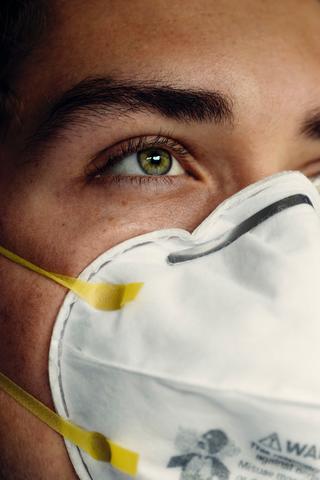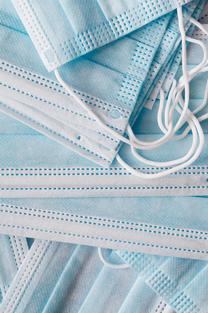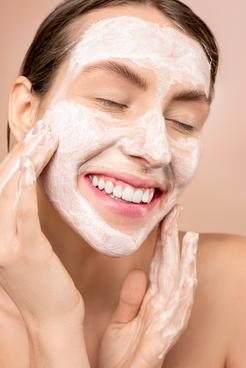How To Avoid Acne From Wearing Face Masks
 Due to the ongoing Coronavirus (COVID-19) outbreak, many people have been wearing protective face masks to help prevent the spread of the virus. As the UK reviews steps to ease lockdown, it has become mandatory to wear a face mask on public transport and when visiting the hospital.
Due to the ongoing Coronavirus (COVID-19) outbreak, many people have been wearing protective face masks to help prevent the spread of the virus. As the UK reviews steps to ease lockdown, it has become mandatory to wear a face mask on public transport and when visiting the hospital.
However, for people with sensitive skin, wearing a face mask can cause or exacerbate acne, rosacea, eczema, and other skin conditions.
The moist, humid environment caused by wearing a face mask traps sweat, natural oils, and dead skin, leading to an outbreak of acne.
Friction against the face, particularly around the chin, cheeks and bridge of the nose, can cause an itchy rash or exacerbate acne symptoms.
The acne that develops has been nicknamed 'maskne' – a contraction of 'mask' and 'acne'. Acne is an unpleasant and often embarrassing condition which usually afflicts the face, causing itchy red blemishes.
While wearing a face mask can hide your physical appearance, which can boost your confidence when you're out and about, it doesn't treat the underlying condition and can actually worsen the irritation.
There are ways to prevent and even treat maskne, and, as with most skin conditions, it's a case of trying different things to find the one that works best for you.
Here are some things to consider to prevent and treat maskne.
Choosing the right type of face mask
Doctors, nurses, and other healthcare professionals wear a specific type of medical-grade mask, referred to as an FFP3 face mask. However, for the public, many people are opting for more affordable options, such as surgical masks, paper masks, washable fabric masks, or homemade masks made from scarves, t-shirts, or bandannas.
The different materials used to make face masks can impact people's skin in different ways. For example, paper masks can cause constant friction against your face, combined with the trapped warm air and moisture, which can create or worsen existing skin problems.
On the other hand, reusable face masks can cause dryness, which leads to irritation, since many fabrics used for them absorb the natural oils on our skin.
Additionally, the residue from laundry detergents and fabric softeners can also lead to clogged pores and irritation from contact. Also, if you are already prone to acne, avoid cloth masks made of rough fabrics and opt for ones made with cotton fibres instead.
While it’s important to ensure a tight seal around the edge of your face mask, this can put pressure on your skin and cause discomfort, particularly on the nose.
For many people, it will be a matter of trying out different face masks and finding the one that suits their skin type best.
Aside from having the most appropriate mask for you, it's equally important to ensure you are wearing it properly. You should be careful when putting on and taking off your face mask to mitigate the risk of accidentally contaminating yourself and other surfaces. Check out our guide for putting on and taking off face masks for more information,
Always wear a clean face mask
Some people are using disposable masks that can be thrown away after each use, however the UK government has encouraged people to make their own masks.
The danger with such fabric masks is that they can end up harbouring germs and dirt. This is why cleaning your mask is so important.
If your face mask is reusable, you should wash it as soon as you take it off.
For non-reusable masks, dispose of them after use.
By doing this, you are reducing the risk of spreading germs and helping your skin from breaking out further. It is a good idea to have at least two face masks. This way, you will always have a fresh face mask on hand, even if one is in the wash.
If your mask is washable, your choice of detergent matters. Consider washing your face mask in non-bio detergent if you have sensitive skin.
Make sure to let your mask dry completely after every wear and then wash it to remove any sweat and dirt that may have been trapped inside.
Please also be mindful that when wearing a face mask, avoid touching it throughout the day, as germs on the mask could be passed onto your hands.
Apply moisturiser before wearing your face mask
Moisturiser keeps your skin hydrated and acts as a barrier to friction from your face mask.
Apply the moisturiser around your mouth and nose area, as well as anywhere the face mask is likely to rub against your skin, to help form a barrier.
For the best results, choose a moisturiser which is fragrance and oil-free.
Remove any make-up as soon as you take off your face mask
Ideally, if you are wearing a face mask, it is best to avoid wearing make-up, or at least minimise the amount to avoid clogging the pores around the area where the mask sits.
If you are wearing make-up, make sure you remove it as soon as you take your face mask off. As the mask has been on your skin for however long, it may clog your pores.
Wash your face thoroughly once you remove the face mask to remove unwanted bacteria, dirt, and dust particles, which can all cause irritation and sensitivity.
Opt for a gentle moisturising soap, such as Dove, to wash your face. You can also use an emollient designed for sensitive skin, such as Hydromol or Aveeno.
It is also important to pat your face dry with a towel rather than rubbing your skin. This prevents unnecessary friction, which can irritate the skin and exacerbate symptoms further.
Stick to a gentle skincare routine

Make sure your skincare routine is gentle. Avoid fragrant products, as they can aggravate your skin further.
Avoid washing your face more than once a day, as frequent washing of the skin can remove natural oils that keep your skin hydrated and can exacerbate your symptoms.
For acne sufferers, products containing benzoyl peroxide usually help.
Ask a pharmacist about over-the-counter treatments which can reduce your symptoms. They will be able to help you choose the most suitable treatment for you and your skin type.
If your maskne is getting worse no matter what you try, make an appointment with your doctor, who will be able to advise you further on treatments which might be more suitable for you.
For persistent acne, your GP may be able to prescribe an acne treatment such as Epiduo. You can buy acne treatments such as Epiduo online from Prescription Doctor.
We offer a range of acne treatments which you can order online and have delivered to your door the next day.
© 2013 - 2026 Al Muhsineen Limited. All Rights Reserved. Registered Pharmacy: 34 Halliwell Road, Bolton BL1 8RL. Registered Office: 254 First Floor, Shearbrow, Blackburn, England, BB1 8DS





